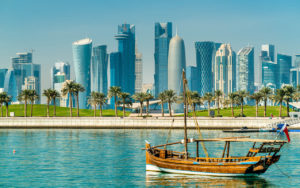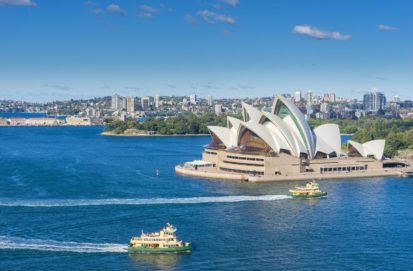Immigration updates for China, India, Qatar and more.
Asia-Pacific
China: Beijing adjusts travel policies for inbound and domestic travelers
Passengers on overseas direct flights to Beijing must either be Chinese citizens or nationals. The entry of transit passengers from third countries will be strictly controlled. The relevant embassies and consulates abroad will thoroughly review the travel history of those who intend to take direct flights to Beijing prior to departure. Those who don’t meet the requirements will not be issued the international version of the health code or declaration.
Airlines should remind Beijing-bound travelers of the restriction on third-country transfers during ticket sales and check-ins. Transfer passengers should not be allowed to check in or board a flight to Beijing. All passengers must complete the “commitment letter for Beijing arrival” prior to boarding. Those who conceal information regarding their travel history or health status shall bear the legal consequences of their actions.
The quarantine requirements for international arrivals remain unchanged at 14+7+7 days.
International arrivals landing in other Chinese cities:
Currently there is no citizenship restriction on inbound passengers landing in other Chinese cities. However, those who intend to travel to Beijing after arriving in another Chinese city should follow the additional requirements for domestic arrivals until March 15, 2021.
Domestic arrivals from low-risk areas:
- Must present a negative nucleic acid test result taken within seven days prior to arrival.
- Take another two nucleic acid tests on the seventh day and 14th day of their stay in Beijing as part of a 14-day health monitoring period.
- During the 14-day health monitoring period, arrivals can go out but should not attend any group activities or gatherings.
Domestic arrivals from medium/high-risk areas:
- Arrivals from medium and high level risk areas, and those in communities under lockdown management, should not return to Beijing until March 15 (unless prior approval is granted from local provincial-level Virus Control and Prevention departments).
Note: Applications for a Beijing Residence Permit will only be accepted after completing the initial 14+7 quarantine requirements.
This summary was prepared using information obtained from the People’s Government of Beijing Municipality and China Daily.
Non-Chinese nationals from Canada and Argentina are temporarily suspended from entry
On January 30, 2021, the Chinese embassy in Canada announced the following:
- All foreign-national holders of valid Work-type and Dependent-type Residence Permits are not allowed to enter China from Canada (their Residence Permits are effectively suspended).
- A new visa must be issued to enter China.
- Holders of diplomatic, service, courtesy, or C crew visas remain unaffected.
The updated list of countries restricted from entering China without a new visa are: Bangladesh, Belgium, Canada, Ethiopia, France, India, Italy, Nigeria, Philippines, Russia, Ukraine and U.K.
Additionally, the Chinese embassy in Argentina is temporarily unable to issue health codes for those who hold a valid Work-type and Dependent-type Residence Permit. While this is not an explicit restriction against foreign nationals entering from Argentina, the inability to obtain a health code would mean being unable to board a China-bound flight.
No source available at the time of writing.
India: International flight ban extension
India has extended its international flight bans until February 28, 2021. Countries with agreed bilateral agreements can operate flights. However, the limitations on flights from the U.K. has been extended to February 14 as described below:
India has signed bilateral air travel agreements with Afghanistan, Bangladesh, Bahrain, Bhutan, Canada, Ethiopia, France, Germany, Iraq, Japan, Kenya, Kuwait, the Maldives, the Netherlands, Nigeria, Nepal, Oman, Qatar, Rwanda, Tanzania, Ukraine, the United Arab Emirates, the U.K. (limited flight operations between India and U.K. resume under the bilateral agreement until February 14, 2021, and will be restricted to five airports: Delhi, Mumbai, Bengaluru, Hyderabad and Chennai) and the United States.
No source available at the time of writing.
Disclaimer: The above information is provided for general information purposes only and should not be construed as legal advice. If you have any further inquiries regarding the applicability of this information, please contact Debra Jane Beynon, Regional Immigration Manager (APAC).
Europe, Middle East and Africa
Qatar: End of blockade eases regional tensions and benefits UAE and GCC economies
Saudi Arabia, along with other states, has agreed to reopen its land and air borders, ending the three-and-a-half-year blockade. The end of the blockade will benefit Qatar immensely through airspace access, shorter flight times, border and embassy re-openings, and tourism.
This summary was prepared using information obtained from Simple Flying and AlJazeera.
United Arab Emirates: Law adopted to grant citizenship to foreign investors and professionals
On January 30, 2021, the UAE announced major changes to its citizenship law, allowing for the naturalization of foreign investors, doctors, scientists, artists and talented people and their families.
Impact
Expatriates who are granted UAE citizenship under the new law will be given the right to establish and own companies in the UAE, as well as buy and own land and real estate property in the country. And any other right extended to them by the federal bodies, with the approval of the Cabinet, or by local government bodies.
The amendments are:
- Doctors and specialists must be specialized in a unique scientific discipline or scientific principles that are highly required in the UAE, and have acknowledged scientific contributions, studies and research of scientific value and practical experience of no less than ten years. In addition to membership of a reputable organization in the field of specialization.
- Scientists must be active researchers at a university, research center or in the private sector, with practical experience of no less than ten years. They should have contributions in their field, such as:
- Winning a prestigious award.
- Securing substantial funding for research in the past decade.
It is also mandatory to obtain a recommendation letter from recognized scientific institutions in the UAE.
- Inventors must have had at least one patent certified by the UAE Ministry of Economy or any accredited relevant international body, which has a real value to the UAE economy. Also a recommendation letter from the UAE Ministry of Economy.
- Intellectuals and artists must be pioneers in culture, arts, and other talents with at least one international award in those talents in addition to a recommendation letter from the UAE relevant bodies.
- Investors must own property in the UAE.
Key amendments of the Executive Regulations of the Federal Nationality Law:
- Specific categories can acquire the Emirati citizenship including investors, doctors, specialists, inventors, scientists, and individuals with creative talents such as intellectuals and artists.
- The naturalized individual must comply with Emirati laws and officially inform the respective government agency in case of acquitting or losing any other citizenship.
- Families of above categories (spouse and children) can acquire the citizenship as well. These categories can retain the current nationality.
- Acquiring the Emirati citizenship will be done through Rulers and Crown Princess Courts, Executive Councils, and the Cabinet based on the federal entities’ nominations.
The UAE introduced the permanent residency scheme to ensure the social stability of those with long time residency in the country and those who contribute to the well-being and development of society. This allowed for granting five and ten-year “Golden Visas” to certain categories of residents. Thousands of people have been given the Gold Visa in the past two years, including investors, medical professionals, engineers, scientists and specialized talents.
The new changes put the UAE level with many developed nations that appreciate the talents of expatriates. Awarding them the citizenship ensures their social stability and secured future in the country.
This summary was prepared using information obtained from The National News.
Disclaimer: The above information is provided for general information purposes only and should not be construed as legal advice. If you have any further inquiries regarding the applicability of this information, please contact Laxmi Vikraman, Regional Immigration Manager (EMEA).
We track policy changes in over 120 countries. Find out how we can help you in this short video.




